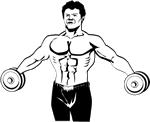Mental Tricks to Enhance Physical Fitness Training

The brain can be altered through sheer mental experience, according to recent research in neuroplasticity. If the brain's experience is related to calisthenics training, a cascade effect can boost strength, coordination, and fitness.
The "experience" can be a real life experience, or it can be simulated – a tactile illusion, perceptual deception, artificial reality, etc.
Mental illusions can trick the athlete into higher physical gear, boosting the results of sports and fitness training.
If you can engineer the brain's experience, you can engineer the brain.

Imagination is one short-cut to enhancing fitness training. Focusing on a specific mental task, such as lifting weights with a finger, gradually increases the finger's strength, endurance, and agility. This fact has been studied in mental research.
The general idea is that the mind influences the body -- and its organic route is taken through the motor cortex. Sensory illusion can also increase the effects of a physical exercise, as seen in the Charpentier-Koseleff illusion. It's a common size-weight deception, in which a smaller object (such as a suitcase) weighing the same as a larger object is felt, or experienced, as weighing more.
One can conclude, then, that lifting a smaller set of barbells – as compared to lifting the same weight in a larger set of barbells – should significantly increase one’s lifting exertions, and hence the aerobic benefits.

According to additional research, the motor cortex is also stimulated by the act of seeing a body part, or illustrations of one. It’s probable both exercise and imagination can be coordinated together to increase the effect.
Thus, seeing one's animated reflection in a mirror during the exercise should equate to a mental process similar to imagination, and should increase the benefits of such exercise.
Installing a set of wall-mirrors in sports-training centers should facilitate athletic improvement.
The next time you find yourself lifting weights, decide to perform the exercise in front of a mirror, using small heavy objects, as opposed to large, equally-heavy objects.

The exploration of experiential illusion offers a promising frontier that could, perhaps, be manipulated – in artful fashion -- to produce profound neurological effects.
Back to Mind Bluff
Links to Other Sites




